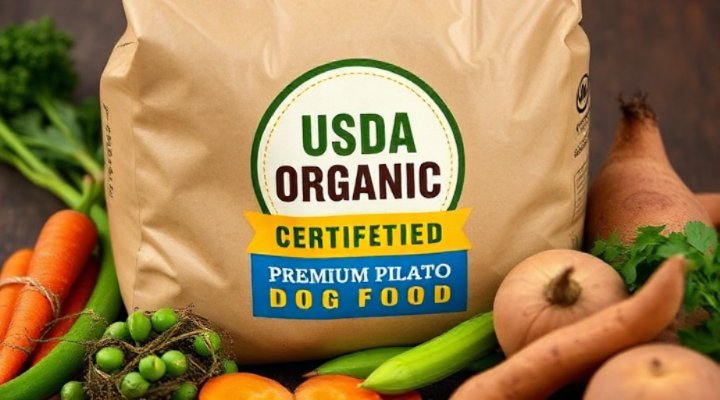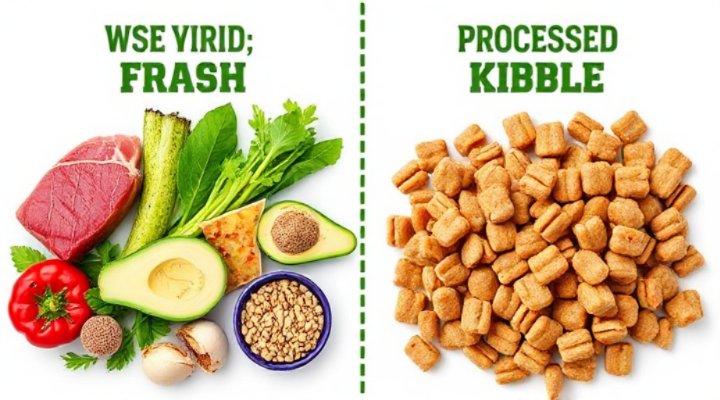When I first adopted my golden retriever, Max, I’ll admit I didn’t think much about his food beyond the basic nutritional requirements. Like many pet owners, I grabbed whatever was on sale or had appealing packaging. However, after Max developed some digestive issues and his coat lost its shine, my veterinarian suggested switching to certified organic dog food. The transformation was nothing short of remarkable—within weeks, his energy levels improved, his digestion normalized, and that beautiful golden coat returned with even more luster than before. This personal experience opened my eyes to the incredible organic dog food benefits that go far beyond basic nutrition.

What Exactly Defines Organic Dog Food?
Organic dog food represents more than just a marketing buzzword—it’s a certification-backed commitment to quality and purity. According to the USDA Organic Standards, certified organic pet food must meet strict guidelines that prohibit synthetic pesticides, chemical fertilizers, genetically modified organisms (GMOs), and artificial preservatives or colors. Essentially, organic dog food benefits begin with what’s NOT in the formula—all those potentially harmful additives that can accumulate in your dog’s system over time.
Furthermore, organic certification requires that ingredients come from farming practices that maintain soil health, promote biodiversity, and use renewable resources. This means that when you choose organic, you’re not only getting cleaner ingredients for your dog but also supporting agricultural methods that are better for our planet. It’s a win-win situation that more pet owners are recognizing as essential for long-term health.

Key Organic Dog Food Benefits for Canine Health
Reduced Exposure to Harmful Chemicals
One of the most significant organic dog food benefits is the dramatic reduction in your dog’s exposure to pesticides and synthetic additives. Conventional dog foods often contain residues from pesticides used on crops, which can accumulate in your pet’s fatty tissues over time. Research from institutions like the Environmental Protection Agency has shown that chronic exposure to certain pesticides can contribute to health issues ranging from digestive problems to more serious conditions.
Organic certification ensures that ingredients are grown without synthetic pesticides, herbicides, or fungicides. This means your dog isn’t consuming these chemical residues with every meal. For dogs with sensitive systems or existing health conditions, this reduction in chemical load can make a noticeable difference in their overall wellbeing and vitality.
Enhanced Nutritional Quality
Organic farming practices often result in more nutrient-dense ingredients, which translates to better nutrition for your canine companion. Studies have shown that organically grown foods can have higher levels of certain antioxidants and beneficial nutrients compared to conventionally grown alternatives. These nutritional advantages represent crucial organic dog food benefits that support your dog’s immune system, cellular health, and overall vitality.
Additionally, organic standards typically prohibit the use of artificial preservatives like BHA, BHT, and ethoxyquin, which are common in conventional pet foods. Instead, organic formulas use natural preservatives like mixed tocopherols (vitamin E) and rosemary extract, which are not only safer but can provide additional health benefits. This commitment to natural preservation is another layer of the organic advantage that conscientious pet owners appreciate.

Digestive Health Advantages of Organic Formulas
Many pet owners report significant improvements in their dogs’ digestive health after switching to organic options. This isn’t surprising when you consider that organic dog food benefits include the absence of artificial colors, flavors, and preservatives that can irritate sensitive digestive systems. Furthermore, organic formulas often feature simpler ingredient lists with recognizable whole foods, making them easier for dogs to digest and absorb nutrients from.
For dogs with food sensitivities or allergies, organic options can be particularly beneficial. The strict standards for organic certification mean there’s less chance of hidden ingredients or contaminants that might trigger allergic reactions. If you’re dealing with a dog who has a sensitive stomach, exploring organic alternatives might provide the relief your pet needs without resorting to specialized prescription diets.
Long-Term Health and Wellness Benefits
The organic dog food benefits extend far beyond immediate digestive improvements. By providing cleaner nutrition with higher-quality ingredients, organic formulas support long-term health in ways that might not be immediately visible but contribute significantly to your dog’s quality of life as they age. Better nutrition means better cellular function, which translates to improved organ health, joint function, cognitive maintenance, and overall vitality throughout your dog’s life stages.
Many veterinarians note that dogs fed high-quality organic diets often maintain healthier body weights, have shinier coats, and exhibit more stable energy levels throughout the day. These visible signs of health are external indicators of what’s happening internally—proper nutrition supporting every system in your dog’s body. For senior dogs especially, these organic dog food benefits can make a substantial difference in their comfort and mobility during their golden years.

Environmental and Ethical Considerations
While the primary focus is on your dog’s health, it’s worth noting that choosing organic also supports more sustainable agricultural practices. Organic farming methods tend to be better for soil health, water conservation, and biodiversity compared to conventional agriculture. By selecting organic dog food, you’re voting with your dollars for farming practices that are better for the planet your dog (and you) call home.
Additionally, organic standards often include better animal welfare provisions for any animal-derived ingredients. This means that the meat, eggs, or dairy in organic dog food typically come from animals that were raised with access to the outdoors, without routine antibiotics, and with more humane treatment overall. For pet owners who value ethical consumption, this represents an important aspect of the organic choice that aligns with their values.
Making the Switch to Organic Dog Food
Transitioning your dog to organic food should be done gradually to avoid digestive upset. Start by mixing a small amount of the new organic food with their current food, gradually increasing the proportion over 7-10 days. This slow transition allows your dog’s digestive system to adjust to the new formula and helps ensure they accept the new food willingly.
When selecting an organic dog food, look for the USDA Organic seal to ensure you’re getting a genuinely certified product. Read the ingredient list carefully—even within organic options, quality can vary. Look for named protein sources as the first ingredients, whole foods rather than processed fractions, and avoid any products that seem to rely heavily on fillers, even if they’re organic fillers.
Remember that every dog is unique, and what works for one might not work for another. Pay attention to how your dog responds to the new food—their energy levels, coat condition, stool quality, and overall demeanor will tell you whether the switch is benefiting them. Some dogs might do better with a different protein source or formulation, so don’t be afraid to try another certified organic option if the first choice doesn’t seem ideal for your pet.

Organic Dog Food Myths Debunked
Despite the clear organic dog food benefits, some misconceptions persist. One common myth is that organic dog food is prohibitively expensive. While premium organic options do cost more than conventional grocery store brands, the price difference has narrowed significantly as organic production has scaled up. Furthermore, when you consider potential savings on veterinary bills and improved quality of life for your dog, many pet owners find the investment well justified.
Another myth suggests that organic dog food lacks scientific backing or nutritional adequacy. In reality, all commercial pet foods—organic or conventional—must meet the same AAFCO nutritional standards for complete and balanced nutrition. The difference lies in the quality and sourcing of ingredients, not the fundamental nutritional adequacy. Reputable organic brands invest heavily in research and development to ensure their formulas provide optimal nutrition while meeting organic standards.
Conclusion: Why Organic Matters for Your Dog’s Health
The decision to feed your dog organic food represents an investment in their long-term health and wellbeing. The organic dog food benefits—from reduced chemical exposure to enhanced nutritional quality—contribute to a foundation of health that can help your canine companion thrive throughout their life. While organic options might require a slightly higher financial investment, many pet owners find that the improvements in their dog’s health, vitality, and overall quality of life make the choice unquestionably worthwhile.
Remember that optimal canine health involves more than just food—regular exercise, preventive veterinary care, mental stimulation, and plenty of love all contribute to your dog’s wellbeing. However, nutrition forms the foundation upon which everything else is built, making the choice of high-quality, clean ingredients one of the most important decisions you’ll make for your pet’s health. By choosing certified organic dog food, you’re providing your furry family member with the pure, nutritious foundation they deserve.
Related Keywords: organic pet food advantages, certified organic dog nutrition, natural dog food benefits, pesticide-free dog diet, synthetic additive-free pet food, healthy canine nutrition, organic dog food advantages, clean ingredient dog food, sustainable pet nutrition, ethical dog food choices
